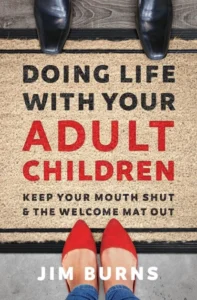The Bible says that children should obey and submit to their parents (Ephesians 6:1; Colossians 3:20). But our son says that because he’s an adult, this commandment doesn’t apply to him anymore. When does an adult child become fully independent of his parents’ control?
ANSWER:
For most children, entering adulthood is culturally defined. For example, in the Jewish tradition, a boy is considered a man at 13. In America, the threshold of adulthood recognized by law is 18.
Age differs from society to society. And an individual’s level of maturity also impacts the journey. But the basic idea is the same: “When I was a child, I spoke like a child, I thought like a child, I reasoned like a child. When I became a man, I gave up childish ways” (1 Corinthians 13:11, ESV).
Change is inevitable …
Once a child becomes an adult, the parent-child relationship should change. Your child starts to become your peer instead of a dependent minor. And he’ll move toward a position of self-responsibility and become accountable to a higher authority — the authority of God Himself.
In God’s eyes and under His leadership, your child transitions into a separate and self-determining person. He has the right to leave home and make his own way in the world, whether or not he takes immediate advantage of the chance.
At this point, his personal decisions must be based on something more than a matter of simple submission to Mom’s and Dad’s rules. He’ll have to choose to act on the wisdom you’ve tried to build in him over the years and out of an awareness of his personal responsibility toward his Creator.
In other words, if your son goes to church, it should be because he has a heartfelt desire to serve Christ and connect with fellow believers — not because you “make him go.”
If he stays away from drugs and alcohol, it should be because he understands the negative consequences of substance abuse and wants to honor his own body as the temple of the Holy Spirit.
If he gets to bed at a decent hour on weeknights, it should be because he wants to be at his best for school or work the next morning — not because he’s sticking to an enforced curfew.
… But change is rarely easy
Now, none of this means that your son has the right to treat you dismissively or to criticize your values and opinions.
Christians know that there’s no justification for treating another person with disrespect. What’s more, as your peer, your adult son remains under an obligation to submit to you not as his parents but as fellow human beings and as his brother and sister in Christ (Ephesians 5:21; Philippians 2:3; I Peter 5:5).
And there’s no age limit to the biblical command to honor our parents. As Paul writes (quoting Exodus 20:12), “‘Honor your father and mother’ (this is the first commandment with a promise), ‘that it may go well with you and that you may live long in the land'” (Ephesians 6:2-3, ESV).
At the same time, “honor” doesn’t necessarily mean that an adult child has to do whatever his parents ask.
A parent might wish that an adult child would accept every piece of advice they offer — but that’s unrealistic. Or a parent might ask the adult child to behave in ways that are unhealthy, unwise, or even harmful (for example, by requiring the child to have Sunday dinner at the parents’ house every week despite conflict with the child’s spouse). In these cases, we believe it’s important for adult children to stand their ground firmly but lovingly.
Yes, children, teens, and adult sons and daughters should treat their parents with respect (Ephesians 6:2). “But it cuts both ways,” says John Piper. “‘Fathers, do not provoke your children to anger‘ (Ephesians 6:4). Of course people can get angry for no good reason. But the point is: Don’t give them a good reason.”
Next steps
We don’t know what led you to ask your question. However, it’s not uncommon to find this transitional phase in the parent-child relationship kind of rough. What can you try?
- Sit down with your son to talk openly about mutual expectations.
- Hold a ceremony or rite of passage that can help redefine roles and establish new guidelines.
- If your son still lives at home, it’s especially important to spell things out as clearly as possible. You need to be able to say, “As you approach adulthood, here’s what changes and here’s what stays the same.”
- Resist the temptation to manipulate or control. You’re free to make as many rules as you like, but make sure they’re reasonable and deal with big-picture issues, not personal preferences.
Call Focus on the Family for help
When there’s a struggle for control between parents and an adult son or daughter, there usually are deeper issues — often around respect and personal boundaries. Would you like to talk more?
Call us for a free over-the-phone consultation at 1-855-771-HELP (4357). Our licensed or pastoral counselors would be glad to help. They can also give you referrals to Christian family counselors in your area. In the meantime, dig into the resources listed here.
If a title is currently unavailable through Focus on the Family, we encourage you to use another retailer.
Setting Boundaries With Your Adult Children: Six Steps to Hope and Healing for Struggling Parents
The Peacemaker: A Biblical Guide to Resolving Personal Conflict
Get This Book for a Gift of Any Amount

Doing Life With Your Adult Children: Keep Your Mouth Shut and the Welcome Mat Out
Receive the book Doing Life With Your Adult Children plus a free audio download of “Learning Your New Role as the Parent of an Adult Child” for your donation of any amount! In addition, you’ll get member-exclusive benefits when you make a recurring gift today. Your monthly support helps families thrive.











